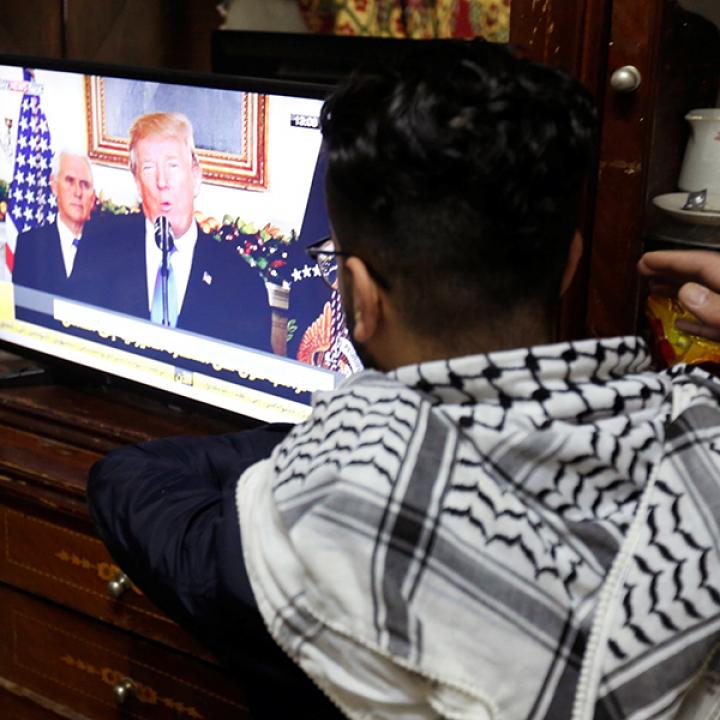
- Policy Analysis
- Fikra Forum
New Palestinian Poll Reveals “Wait and See” View of Trump Peace Plan

A new poll by the Palestine Center for Public Opinion, taken June 27-July 19, indicates that the majority of Palestinians in the West Bank and Gaza oppose their leaderships’ preemptive rejection of the Trump administration’s peace plan—despite widespread popular disapproval of the current U.S. president. The survey also shows a dramatic rise in the proportion supporting an enhanced role in peacemaking for the Arab states. More specifically, however, only a minority voice a favorable attitude toward the June regional economic workshop in Bahrain, with many saying they have not heard or read enough about it.
Surprisingly, given the very negative Palestinian official and media commentary on the Trump peace plan, only one-third of respondents in either the West Bank or Gaza agree that the Palestinian Authority “should reject it now.” Instead, a larger percentage advocate a more measured position: around one-quarter in each territory say “the PA should not reject the plan, so Israel won’t be able to take advantage” of that; and an additional one-quarter say “the PA should look at the plan when it is officially released, before taking any position on it.” In the West Bank, 23% admit they too “haven’t heard or read enough” about the peace plan to venture an opinion about it. Among Gazans, the comparable figure is just 12%.
Moreover, on the related issue of the U.S. push for a broader Arab role in regional peacemaking, Palestinian public opinion has taken a sharply positive turn since the previous poll in October 2018. Today, 61% of West Bank respondents, and an astonishing 86% of those in Gaza, agree that “Arab states should take a more active role in Palestinian-Israeli peacemaking, offering both sides incentive to take more moderate positions.” Last year, only about half agreed with that idea.
Nevertheless, on the specific question of the June 25-27 regional economic workshop in Bahrain, the Palestinian public seems to have a predominantly unfavorable view. Just 30% of respondents in Gaza, and a mere 14% in the West Bank, think that gathering was “a good idea.” Around half in each territory call it “a bad idea.” But an extraordinarily high 40% of West Bankers, and 19% of Gazans, say they haven’t heard or read enough about the Bahrain workshop to offer an opinion about it—perhaps, at least in some cases, because they are reluctant to contradict the official PA and Hamas opposition to it.
On the broader question of relations with the United States, only a narrow majority (56%) of West Bank respondents support the PA’s official boycott of the Trump administration. Among Gazans, that figure is even lower, at 40%. Similarly, when asked about a list of possible priorities for U.S. policy, just 32% of West Bankers and a mere 12% of Gazans pick “stay out of Palestinian and Middle East affairs altogether.”
These unexpectedly moderate views of current U.S. policy are not matched by favorable attitudes toward President Trump personally. In fact, only 8% of West Bank respondents and 11% of Gazans express even a “fairly good” opinion of him. By comparison, Saudi Arabia’s Crown Prince Muhammed bin Salman gets a good rating from 22% of West Bankers and 38% of Gazans. And Turkey’s President Recep Tayyip Erdogan leads the pack by far: a remarkable three-quarters of Palestinian respondents in both territories credit him with a favorable rating.
METHODOLOGY
These findings are from a personal interview survey with representative samples of 500 West Bankers and 500 Gazans, conducted using standard geographic probability techniques in each territory. The Palestinian polling company employs highly trained and experienced local professionals, with advanced quality controls using computerized real-time response inputs with precise GPS monitoring, and strict assurances of confidentiality. Previously, their sample design, fieldwork, and data processing methods have been personally supervised and approved by the author. The statistical margin of error in each territory is approximately 4%. Additional methodological details are readily available on request.







